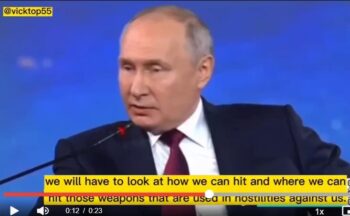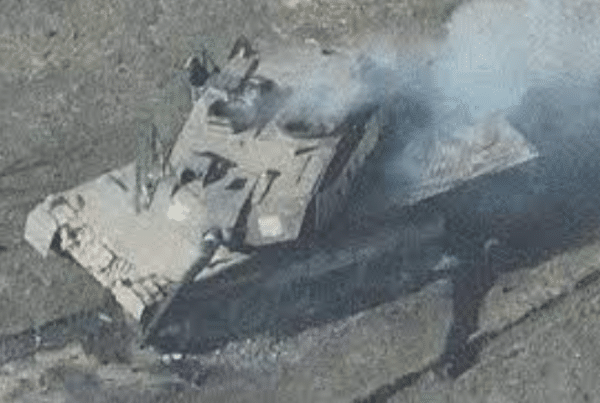There is a fraction of the Germans who, when speaking or writing in public, consider themselves the good Germans. Good Germans are to Germany as propaganda is to truth—negligibly fractional; sometimes truth-telling; always irrelevant to the outcome of the wars which Germany wages.
The political comprehension of the Germans–to adapt Mao Zedong’s axiom that political power comes out of the barrel of a gun–only comes out of the barrel of a Russian gun. The good Germans define themselves publicly by wishing this weren’t true because they realise there’s nothing they can do to stop the rest of their countrymen from throwing themselves at Russian guns until there are no more of them, the good Germans among them.
One of these wishfully good Germans is called Florian Roetzer, who founded the widely read internet publication Telepolis in 1996, and retired to write elsewhere in 2021. Roetzer has just published his analysis of the transcript of last month’s teleconference at which the chief of the German Air Force, Lieutenant General Ingo Gerhartz, discussed with three subordinates a plan of attack on Russian civil and military targets with the German Taurus KEPD 350E cruise missile; conceal this German operation behind British, French, and Ukrainian forces and German commercial companies; accelerate the missile deliveries; and present the plan for approval by German Defense Minister Boris Pistorius and Chancellor Olaf Scholz.
Gerhartz is not only waging personal war against Russia, as he explained on the telephone two weeks ago, on February 19. Last November he declared personal war in alliance with the Israel Air Force in implementing the genocide of Gaza.
The Gerhartz transcript, translated from German, can be read here.
In Roetzer’s new analysis, published on March 2 in Overton magazine,
The problem is not (in Roetzer’s mind) that Gerhartz and the Bundeswehr are losing their war on the Ukrainian battlefield, or that they are aiming to provoke Russian counterattack against German targets outside that battlefield.
The fact that Russia was able to eavesdrop on the conversations of the German officers…is a major problem for the Bundeswehr, also in relation to its partners, who may no longer trust it.
The bigger [sic] problem, however, has been Putin’s for quite some time, after one red line after another has been crossed by the NATO countries, without Russia really reacting to it, apart from warnings… But so far, Putin has accepted any military support for Ukraine. But if it is now becoming more and more public knowledge that NATO countries are directly supporting Ukraine with target data and in general in attacks with Western missiles and cruise missiles through the participation of soldiers in civilian and intelligence officers, and thus become parties to war, then Putin, who propagates that Russia is defending itself in Ukraine, has the problem of showing weakness and only bluffing, if no action is taken against it.
“It is obvious”—according to Roetzer—
that Russia cannot compete against a NATO weakened by the Ukraine war and therefore avoids a direct conflict. But if the attacks on Russia continue to increase and Western weapons are openly used, Putin will lose support in Russia if there is no military response… With the publication of the wiretapped conversation of the German officers, the Russian leadership may have harmed itself—if only because the Bundeswehr must now try to close the security gap. It is possible that [state media director Margarita] Simonyan has gone too far here. The question is whether the publication was coordinated with the Kremlin.
That Germany is at war with Russia has been understood in Moscow for a long time. That there are good Germans like Roetzer who would like it to be otherwise for moral, legal, German national, or personal reasons is also well-known. Some of these good Germans have even served as German generals.
What the Navalny Novichok episode of the autumn of 2020 revealed, followed by the destruction of the Nord Stream pipelines in September 2022; and now last month’s teleconference conducted by Gerhartz—what all three episodes reveal is not how the Germans are understood in Moscow, but rather how the good Germans react when confronted with the war they are powerless to deter or stop their countrymen from waging.
The impotence of the German opposition to this war is also well understood in Moscow. What remains is for the Kremlin and General Staff to decide to teach the Germans the only lesson by the only method they understand. That is the lesson the Germans have been failing to learn for seventy-nine years next month–since April 30, 1945, when Adolf Hitler shot himself before he could be captured by the Red Army waiting outside his bunker in Berlin.

Left: “Who is most harmed by the wiretapped conversation of German Air Force officers about Taurus” by Florian Roetzer. How Roetzer determined that the leak of the conversation was by Russian wiretapping, he doesn’t say. Right: Florian Roetzer.
Overton is a secretive German publication based in Frankfurt; called by an English revolutionary name, the magazine reveals nothing about its sources of money, the names of its directorate, or its location–except to say on the home page of its website that it’s “a voice against debate constriction and moralism. It questions the general narratives and is decidedly not an ideological mouthpiece or organ of pronouncement, but feels committed to the Enlightenment.”
The context of the Gerhartz teleconference of February 19, 2024, is the ambition of the newly established Bundeswehr Space Command, headed by Major General Michael Traut, who inaugurated the command’s new headquarters in April 2023. Traut is one rank below Gerhartz but reports independently; two of the officers who participated in the teleconference, Fenske and Frostedte, report to Traut; they rank below Brigadier General Frank Graefe, deputy chief of the Air Force staff for operations, the fourth participant in the conference call. Neither Roetzer nor any other German reporter has identified the full names of Fenske and Frostedte, their units, ranks, and operational responsibilities.
From the published recording, it appears Fenske and Frostedte have been reporting to Graefe on the German Air Force’s use of satellite and other means for Russian targeting (“maximum accuracy of up to three meters”); delivery of target data to missile launch operations; training of Ukrainian operators; and fittings for the aircraft the German Air Force plans for launching the Taurus missiles against the Russian targets; on the tape Gerhartz says “no matter whether it is a Sukhoi or F-16.”

Left: On April 3, 2023, General Traut opened his command headquarters with cartoon stormtroopers to simulate the Russian enemy. Right: Traut.
The German officers don’t mention the range of the Taurus missiles they are planning to use in their operations.
The German Air Force base at Büchel, which stores nuclear bombs and warheads of the U.S. Air Force, is mentioned in the conversation as the operational centre for the plan of attack, “subject to the creation of a secure connection with Ukraine.” F-16s operate from Büchel and, 70 kilometres away, from the Spangdahlem Air Base.
The audio tape is of German soldiers discussing air operations against Russia from a nuclear-armed airbase. The frankness of their war objectives against Russia, and of their attempts to camouflage their “tricks”, as Gerhartz calls them, for German political and public purposes is not what is “new” in this disclosure. Rather, what is “new” is the context of this teleconference among all the others happening in parallel—this is the certainty that when German army officers and German naval officers discuss operations at the general staff level before briefing Defense Minister Pistorius, they are just as committed to attacking Russia as Gerhartz and his airmen.

Buchel Air Base in western Germany. According to Fenske, the base may provide target data and other technical support for the operation against Russian targets. Gerhartz agreed, but added camouflage: “Politicians may be concerned about the direct, closed connection between Büchel and Ukraine, which could become direct participation in the Ukrainian conflict. But in this case, we can say that the exchange of information will take place through MBDA [MBDA Deutschland GmbH is the German missile systems company which produces Taurus], and we will send one or two of our specialists to Schrobenhausen [MBDA’s headquarters]. Of course, this is a trick, but from a political point of view it may look different. If information is exchanged through the manufacturer, then this is not associated with us.”
The nuclear warhead capability of the Taurus missile is not news in Germany.
Also, the Russians already understand that if an F-16 takes off for a Russian attack operation, it will be “burned”, to use the term President Putin used in his warning of June 26, 2023. “The F-16 will also burn, there is no doubt. But if they are located at air bases outside Ukraine, and used in combat operations, we will have to look at how to hit and where to hit those means that are used in combat operations against us. This is a serious danger of NATO’s further involvement in this armed conflict.” Putin meant to include Büchel and Spangdahlem.
In October 2023, Dmitry Medvedev, deputy chairman of the Security Council, added to the Russian counter-targeting for the Taurus. “Ostensibly, this is in accordance with international law. Well, in that case, strikes on German factories where these missiles are made will also be in full compliance with international law”, Medvedev said.
Just two German generals from the retirement list, Brigadier General Erich Vad and Major General Harald Kujat, have publicly declared themselves against German warfighting against Russia. Florian Roetzer is not so categorical or clear.
Roetzer likes to think of himself as a good German. In that guise, he used to publish translations into German of reports on Russian subjects from the Dances with Bears website. That is, until he began to edit words, phrases, and findings whose veracity he did not challenge, but whose political implications in the German context became threatening for himself.
At one point, Roetzer disputed my reports of Russian civilian and military evidence of the presence of NATO officers in the Azovstal bunkers during the Battle of Mariupol in May 2022. He told me:
Whether it is true about the general or other foreign officers should soon become clear. I do believe that there is something to it, but I am still not sure.

Source: https://www.bitchute.com/video/JjxHCw5PP2s9/
I replied: “if you applied this ‘sure’ standard you have already applied to censor me to your other contributors, you would have nothing to publish.” “I didn’t censor you,” Roetzer said,” I just added probably.” I said that was cowardice. “Why cowardice,” Roetzer answered,
when you say you think something is possible but don’t know it? I find it more honest than claiming to know something that you find credible, but which is based on hearsay.
When Roetzer continued to apply his “hearsay” rule and refused to stop the censorship, his permission to republish was cancelled and he was requested to remove everything he had published with my byline.
Roetzer’s application of this hearsay rule to what he thinks he has heard the German generals say last month, and what he thinks, or he has overheard, is the “bigger problem” for President Putin and the Russian General Staff are now on open display. Read Roetzer’s piece in full here.
“The contents of the wiretapped conversation,” Roetzer has concluded, “actually contain nothing new. Ultimately, it could be difficult for Putin.” Roetzer has no evidence the conversation was wiretapped by the Russians. He has no evidence of how the details have been interpreted on the Russian side; his claims that “Putin has accepted any [NATO] military support for Ukraine” and that “Russia cannot compete against a NATO weakened by the Ukraine war” are false.
Since this is how good Germans think and express themselves, General Gerhartz has every reason for the confidence he expressed in his operational plans. “Of course, this is a trick,” he told his subordinates,
but from a political point of view it may look different. If information is exchanged through the manufacturer, then this is not associated with us.
Of course, they weren’t fooled. Only the good Germans are fooled; in this war they are fooling themselves.

